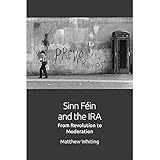Sinn Féin and the IRA : From Revolution to Moderation / Matthew Whiting.
Material type: TextPublisher: Edinburgh : Edinburgh University Press, [2022]Copyright date: ©2017Description: 1 online resource (184 p.)Content type:
TextPublisher: Edinburgh : Edinburgh University Press, [2022]Copyright date: ©2017Description: 1 online resource (184 p.)Content type: - 9781474420549
- 9781474420556
- 941.6083
- online - DeGruyter
| Item type | Current library | Call number | URL | Status | Notes | Barcode | |
|---|---|---|---|---|---|---|---|
 eBook
eBook
|
Biblioteca "Angelicum" Pont. Univ. S.Tommaso d'Aquino Nuvola online | online - DeGruyter (Browse shelf(Opens below)) | Online access | Not for loan (Accesso limitato) | Accesso per gli utenti autorizzati / Access for authorized users | (dgr)9781474420556 |
Frontmatter -- CONTENTS -- FIGURES AND TABLES -- ACKNOWLEDGEMENTS -- 1. INTRODUCTION -- 2. RADICALISM AND MODERATION IN THE HISTORY OF IRISH REPUBLICANISM -- 3. ELECTORAL PARTICIPATION AND REPUBLICAN MODERATION -- 4. DEMOCRATISATION AND REINING IN RADICAL REPUBLICANISM -- 5. THE US AND BROKERING REPUBLICAN MODERATION -- 6. BRITISH POLICY TOWARDS IRISH REPUBLICANISM -- 7. CONCLUSION -- BIBLIOGRAPHY -- INDEX
restricted access online access with authorization star
http://purl.org/coar/access_right/c_16ec
Assesses Irish republicanism’s strategic process of moderation, from violence to peace and powerIRA violence and Sinn Féin’s revolutionary politics plagued Northern Ireland for 30 years. Today, however, violence is (mostly) a tactic of the past and Sinn Féin is a major political player in both Northern Ireland and the Republic of Ireland. This is one of the most startling transformations of a radical violent movement in recent times. What exactly changed within Irish republicanism? What has stayed the same? And, crucially what caused this transformation? By examining republicanism’s electoral participation and engagement in democratic bargaining, together with the role of Irish-America and British government policy, Matthew Whiting argues that moderation was a long-term process of concessions by republicanism in return for increased inclusion within the political system.Key FeaturesDraws on a wide range of original data, including interviews with former leading British and Irish politicians and civil servants; original material produced by republicanism over a 40-year period; and the latest available archival material from Britain, Ireland and Northern IrelandReassesses British policy towards the management of the conflict in Northern IrelandRigorously evaluates where Sinn Féin stands today in terms of achieving its goal of a united IrelandRaises important implications for how other non-state armed groups moderate, for the study of state responses to violent separatism and for studies of comparative peace processes
Mode of access: Internet via World Wide Web.
In English.
Description based on online resource; title from PDF title page (publisher's Web site, viewed 29. Jun 2022)


